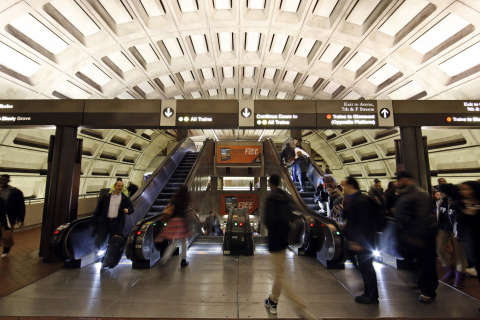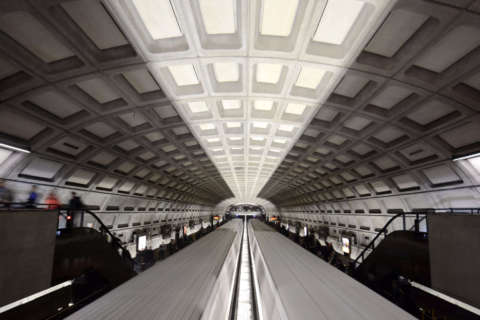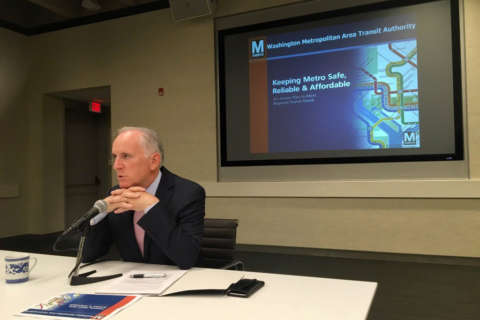WASHINGTON — The former U.S. transportation secretary, tapped to suggest major Metro fixes, does not plan to focus on any ideas of his own.
Ray LaHood asked the Metropolitan Washington Council of Governments Wednesday to come to its own consensus about how to address Metro’s cost structure, governance and who will pay for the billions in Metro rebuilding needs.
“The common denominator in all of these problems is money. It always is,” he said.
Everything is on the table, said LaHood, who is due to report to state leaders in Virginia by mid-November.
“I do not intend to put out a voluminous report, because there are many of those already,” he said. “I see my job as listening and then putting together some consensus points that I hope people can agree on.”
Virginia State Sen. George Barker and Maryland State Sen. Brian Feldman, however, warned that local leaders — like those who make up nearly the entire Council of Governments’ Board of Directors — cannot force the state legislatures in Annapolis and Richmond to go along with any agreement.
Leaders of several Northern Virginia localities Wednesday questioned whether the regionwide 1 percent sales tax recommended by a technical panel would be the best way to fund Metro’s additional needs.
On top of concerns from Loudoun County Supervisor Matt Letourneau about whether the General Assembly would approve it, Fairfax County Board Chairman Sharon Bulova said she now agrees with concerns that Virginia could pay too much under the sales tax proposal compared with Maryland and D.C.
Later Wednesday, Bulova led a closed-door meeting that included negotiations over the position the Council of Governments could take next month on a dedicated Metro funding source.
Among the sales tax alternatives are changes to existing Virginia transportation taxes. That may include incorporating the need for Metro funding into the next push to correct Northern Virginia’s additional gas tax, which was set in 2013 without the minimum level that the state gas tax has.
The group is also considering whether existing Metro funding sources could be changed in a way that would allow Metro to borrow against them.
Business groups support dedicated tax
The Greater Washington Board of Trade is leaning toward supporting a 1 percent regional sales tax, CEO Jim Dinegar said.
“I would tell you it’s the least distasteful, not our favorite,” he said.
Other options include property taxes focused on the properties that benefit most around Metro stations, which could have more of a direct financial impact on businesses than a sales tax, which would be paid by regular consumers.
Dinegar and other business groups believe the region must move quickly in order to meet Metro General Manager Paul Wiedefeld’s call for dedicated funding by January 2019.
“2019 comes up very quickly, very quickly, in the legislative process,” Dinegar said.
The rush should not mean that the region locks in on just one option for Metro’s costs, said Jim Corcoran, Northern Virginia Chamber of Commerce CEO and Metro Board member.
“There is more than one way to skin a cat. … In Virginia, we need to work very closely with the state legislature,” Corcoran said. “It’s not up to the local elected officials to decide what kind of tax it will be.”
“If we cannot get a sales tax passed … what are you going to do then?” he asked the COG Board. “You need to have a couple different things in your arsenal in order to move forward.”
Whatever the solution, there needs to be agreement in time for action in Maryland and Virginia’s General Assemblies this winter, Prince George’s Chamber of Commerce President David Harrington said.
“We have studied this. It certainly deserves more analysis, but we’re going to have to come together for a solution because our workers, our citizens deserve a solution. Our companies deserve a solution. And the economic opportunities are such that if we ignore the urgency of now, we would lose more,” he said.
Dinegar echoed the urgency. And he pleaded with jurisdictions who say Metro must prove that changes have been made (before any new funding is offered) to specify what Metro must show to justify a new dedicated tax.
“So that Metro’s not in the position of bringing back the broom of the Wicked Witch and being told ‘now go get me something else,’” Dinegar said.
LaHood hopes a series of meetings, including upcoming meetings with Virginia Gov. Terry McAuliffe and Maryland Gov. Larry Hogan, could help shape his report and finalize details of what Metro and the region would be expected to do. He already met with D.C. Mayor Muriel Bowser.
“Metro has been a great system. It’s not a great system today — we all know that — but I think everyone is in agreement that it can be a great system again,” LaHood said.
LaHood and others cited his work as transportation secretary to save the Silver Line, when it looked like the project could be canceled, as a signal that he could help the region actually take action this time after years of promises.
“We have a responsibility … to figure out ways to make Metro No. 1 again,” LaHood said.
“Metro is going to be here forever. It is the transportation system for the region. This is it.”








